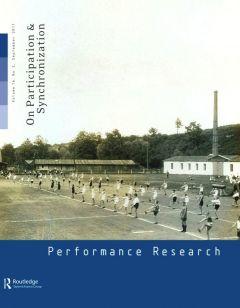On Participation & Synchronisation
Bettina Brandl-Risi, Kai van Eikels u. Ric Allsopp (Hg.) – 2011
In our understanding, ‘participation’ refers to the behaviour of individuals or collectives at the intercept of activity and passivity, of being-moved and moving. Participation does not necessarily imply being involved with groups, institutions, or communities. Participation occurs where an agent receives the impression that his or her own way of undergoing, experiencing, and acting takes places in a ‘real’ or ‘virtual’ proximity to that of others. Instead of reducing this proximity to a pre-figuration of unity (as in many concepts of ‘community’), this issue of Performance Research examines how differences become functional or unfold an organizational potential in processes of participation, without ever vanishing. Synchronizations of actions are key to whether people are motivated to participate, whether offers of participation are accepted or denied, whether participatory efforts are sustained or short-lived. But they also help to set up and model the situational environment of a participatory process, and influence the ‘course’ of such a process and the performative ‘architecture’ of the collective. This rethinking of participation allows for a reconsideration of notions of the performer, the audience, the public, equality, and performance itself.
